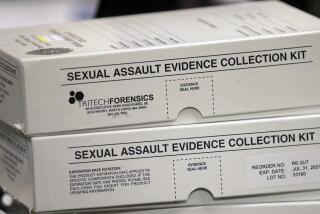Interagency Lab Targets Digital Evidence
- Share via
SAN DIEGO — FBI Director Louis Freeh on Tuesday formally dedicated the nation’s first regional forensics laboratory devoted to interagency cooperation in gathering and assessing evidence from computers.
Freeh said the San Diego laboratory, involving technicians and other law enforcement personnel from 17 federal, state and local agencies, will become a prototype for similar labs elsewhere as more cases require handling of evidence seized from computers.
“There is a critical need for this all over the country and all over the world,” Freeh said.
Since opening earlier this year, the lab’s most common cases have been child pornography and monetary fraud. But the lab has helped with crimes of violence, finding evidence on hard drives and in e-mail files.
“Stalkers, murderers, rapists, robbers--all kinds of people keep notes, and they tend to keep them on their computers,” said San Diego County Dist. Atty. Paul Pfingst.
While there are other single-agency laboratories to collect and analyze computer information, the nondescript building in a suburban business park is the first laboratory bringing together a coalition of agencies. The lab cost about $1.2 million to assemble.
Those involved in the project are working with the engineering department at UC San Diego and the San Diego-based Space and Naval Warfare Systems Command, both of which are on the cutting edge of computer technology and detection.
Among the skills being taught at the lab is how to remove evidence from a computer without damaging the files, how to find ways around firewalls and secret passwords, and how to remove evidence from a computer without disabling it.
In the past, police have been reluctant to seize a computer to probe misconduct on the part of an individual employee if loss of the computer could close the business.
“We don’t want to take an entire business down,” said Rusty Sargent, a detective with the La Mesa Police Department. “They’re really victims, too.”
Much of the evidence in the upcoming case of white supremacist Alexander James Curtis, indicted last week in San Diego for harassing four local officials, may come from his extensive Internet connections in which he kept in touch with like-minded individuals and spread his message of intolerance nationwide.
Officials declined to say whether Curtis’ computers are being analyzed at the lab, but they noted that the lab is fully equipped to do so.
Lab officials said they were surprised at the pent-up demand for computer assistance from local law enforcement.
“The day we opened our doors, we were inundated with cases,” said Ken Basore, the laboratory’s operations manager, a detective with the El Cajon Police Department.
In fighting crime, every bit helps. The dedication of the new facility began with a prayer tailored for the occasion.
“Lord, let this laboratory be a leader in the world,” said the Rev. Ralph H. Buchhorn, an FBI chaplain.
More to Read
Sign up for Essential California
The most important California stories and recommendations in your inbox every morning.
You may occasionally receive promotional content from the Los Angeles Times.













